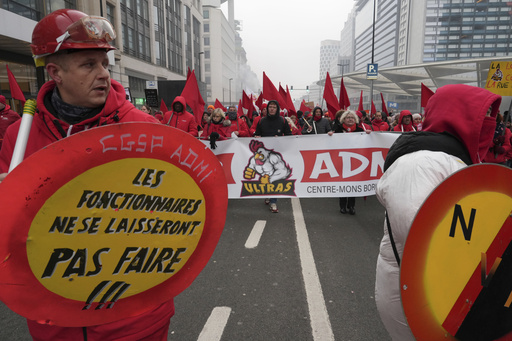
Belgium’s capital city of Brussels was transformed into a stage of mass protest on Thursday with nearly 100,000 demonstrators filling the streets. This demonstration coincided with severe disruptions at airports and public transportation as trade unions voiced their displeasure concerning the new center-right government’s extensive reform plans aimed at overhauling key components of the welfare state.
These proposed changes, particularly reductions in pensions and cuts to public service jobs, lie at the heart of the unrest. The three largest unions united in opposition to Prime Minister Bart De Wever’s government, which is seeking to tackle significant national debt through measures that disproportionately impact lower-income workers.
Bert Engelaar, the secretary general of the Socialist trade union, articulated the unions’ position: “The strongest shoulders must bear the heaviest burdens,” urging that wealthier individuals should contribute their fair share, a call he feels is not currently met.
In the midst of these demonstrations, Brussels Airport suspended all departures, and public transportation services, including buses and trams, were nearly nonexistent. This situation reflects a broader trend throughout Europe, as sluggish economic conditions compel governments to reevaluate previously untouchable social benefits. Belgium currently faces a significant debt load exceeding 100% of its GDP, ranking it among the most indebted countries in the EU.
Compounding the financial challenges is the growing demand from NATO allies, particularly the United States, for Belgium to augment its defense budget according to a 2% GDP guideline. As NATO’s headquarters is located in Belgium, the nation currently allocates just 1.3% of its GDP to defense, positioning it among the least capable of the NATO members, especially in terms of equipment funding.
In response to these pressures, Defense Minister Theo Francken expressed optimism during a NATO defense ministers’ meeting, stating, “We will secure the additional funds. Belgium is a wealthy nation. We will identify the necessary resources.” The focus on defense funding over pensions has sparked further dissent among the public, according to Engelaar.
He remarked, “The decisive choice was made to invest heavily in defense, creating a sense of alarm, as if Mr. Putin could arrive in Brussels tomorrow,” referencing the Russian president’s influence.
The protests, which attracted participation estimates ranging from police figures of 60,000 to union claims exceeding 100,000, were particularly directed against governmental plans to downsize social programs and pension schemes.
De Wever, a member of the Flemish nationalist N-VA party, formed a coalition by bringing together five parties after a prolonged seven-month stalemate, with the Flemish socialists being the sole left-leaning group. In a parliamentary address on Thursday, he reiterated that, “The reforms will occur gradually and prioritize social justice.”
The Vooruit socialist party in Flanders has committed to exerting every effort to protect Belgium’s welfare foundations, even acknowledging that some cuts are unavoidable.
“The house is ablaze; we must implement measures immediately,” Socialist Minister Rob Beenders stated during an interview with the VRT network.
In an effort to maintain pressure on the government, unions have announced plans for a general strike set for March 31.

